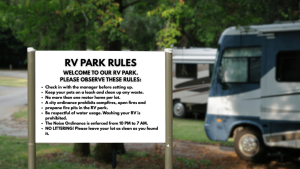Camper FAQs is reader-supported. Buying through links on our site may earn us an affiliate commission. As an Amazon Associate I earn from qualifying purchases.
A lot of folks hit the road with enough gear to rebuild an engine, only to reach for the same handful of tools every time something needs attention. That gap between what people carry and what actually gets used has turned into a running joke in campgrounds.
So let’s talk about the items that genuinely pull their weight. Nothing crazy, just the practical things RVers keep reaching for because they make life easier.
1. Headlamp
A headlamp quietly solves one of the most common annoyances: trying to work while also holding a flashlight under your arm. When you are tracing a leak, checking a hitch after dark, or crawling into a tight bay, a light that follows your eyes makes everything simpler. It takes seconds to toss one into the truck and you end up using it far more than expected.

Lepro LE Headlamp Rechargeable, LED Head Lamp with 6 Modes for Camping & Hiking…
$18.99 ($9.50 / count)
Buy on AmazonLast updated: December 15, 20252. Multimeter
Electricity causes a surprising amount of trouble in RVs, and a multimeter helps you sort things out quickly. It checks the voltage at the campground pedestal so you know if the power is safe before you plug in. It also lets you see if the power feeding your RV is clean or dipping too low under load. A quick test shows if your converter is charging the batteries as it should, and it can help track down simple issues like dead outlets, loose connections, or a tripped breaker hiding somewhere behind a panel. It is a compact tool that answers questions fast and helps you avoid plugging into power that could damage appliances or electronics.

Klein Tools MM325 Multimeter, Digital Manual-Ranging 600V AC/DC Voltage Tester,…
$29.98
Buy on AmazonLast updated: December 15, 20253. Cordless Drill
A cordless drill shows its value right away. Lowering stabilizers, tightening loose hardware, swapping out minor parts, and even tackling small campsite jobs all get easier. A simple bit set turns it into one of the most versatile tools you can carry.

DEWALT 20V Max Cordless Drill Driver Set, 2 Speed, High Performance Motor, Incl…
$109.75
Buy on AmazonLast updated: December 15, 20254. Channel-Lock Pliers
A good pair of channel-locks handles a long list of everyday tasks. They help with water hose connections, coax fittings, battery terminals, and stubborn plumbing pieces. They do not replace every wrench out there, but they cover enough ground that they earn their spot in the bag.

CRAFTSMAN Pliers, 8 & 10", 2Piece Groove Joint Set (CMHT82547)
$21.99
Buy on AmazonLast updated: December 15, 20255. Screwdriver Kit with Multiple Bits
RVs never seem to stick to one screw type. A small kit with Phillips, flat, Robertson, and Torx bits keeps you prepared for almost anything inside the camper or around the exterior. It also saves you from stripping screws with whatever tool happens to be nearby.
6. Small Socket Set
A compact socket set handles bolts, brackets, access panels, and plenty of small mechanical jobs. Having both metric and standard sizes helps because manufacturers often mix them. It takes up very little space and turns out to be useful in all sorts of unexpected situations.

DEWALT Impact Socket Set with Ratchet, Metric/SAE, 1/2" Drive, 23-Piece Set wit…
$56.09
Buy on AmazonLast updated: December 15, 20257. Rubber Mallet
This simple tool fixes more minor headaches than people expect. A gentle tap can free a wheel chock that is stuck under the tire, loosen a tight hub, or help persuade a stubborn piece of hardware. Lightweight and reliable, it earns its place through pure practicality.

Edward Tools Rubber Mallet Hammer 16 oz – Durable Eco-friendly Rubber Hammer He…
$11.95
Buy on AmazonLast updated: December 15, 20258. Torque Wrench
Lug nuts need consistent pressure. Heat cycles and long travel days can shift them over time, which is why a torque wrench helps keep wheels from loosening or tightening unevenly. It takes only a few minutes before a trip and can prevent much larger issues later.

LEXIVON 1/2-Inch Drive Click Torque Wrench 25-250 Ft-Lb/33.9-338.9 Nm (LX-184)
$69.97
Buy on AmazonLast updated: December 15, 20259. PEX Crimper or Crimper–Cutter Combo
Most RV plumbing uses PEX, so having a small crimper makes leak repairs much easier. A combo tool that also removes clamps saves space and makes the job quicker. It is one of those tools you might not think about until the day a fitting starts dripping under the sink.

iCrimp PEX Clamp Tool Kit for 3/8-in, 1/2-in, 3/4-in, 1-in PEX Clamp Cinch & Re…
$34.99
Buy on AmazonLast updated: December 15, 202510. Mechanics’ Gloves
Mechanic’s gloves protect your hands during hot, sharp, or greasy jobs and hold up far better than disposable alternatives. They also give you a stronger grip when working around batteries, hitch components, or metal edges. One pair lasts a long time and slips easily into any tool pouch.

HANDLANDY Mens Work Gloves Touch screen, Synthetic Leather Utility Gloves, Flex…
$9.34 ($9.34 / count)
Buy on AmazonLast updated: December 15, 2025A Few Extras Most RVers Appreciate
There are a few lightweight items that are worth tossing into your kit, even though they technically are not tools. Zip ties help secure loose wires or hoses, electrical tape handles quick fixes on the 12-volt side, and a roll of gaffer tape works well when something needs temporary support. A small assortment of fuses also pays off when a light or appliance suddenly stops working. And some disposable gloves for messy jobs. None of these adds much weight, but they will save time on the road.
Final Thoughts
RV tool kits tend to grow from fear of the unknown. People pack for every scenario they can imagine, then carry the weight for years. In my experience, the items above stay useful across nearly all situations without turning your storage compartments into rolling workshops. If you start with these and add only what you genuinely need later, your setup stays simple and practical.







Write a comment